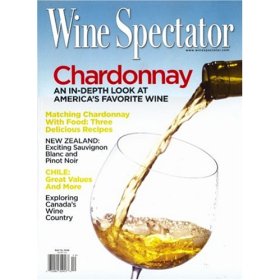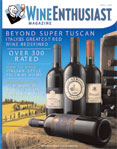Wine Ratings... What Do They All Mean??
Wine ratings... what do they mean to me and should I pay attention to them?  Well... that really is going to be a personal thing. The wine ratings are the opinions of what are considered "sofisticated palates"... people who spend most of their time tasting wines. Well... that really is going to be a personal thing. The wine ratings are the opinions of what are considered "sofisticated palates"... people who spend most of their time tasting wines. As I mentioned previously I have my own rating system which tends to go along the lines of MMMMM  Yum!!  and Yuck!! 

But then again I don't seem to have a "sofisticated palate". Or at least have not as of yet been recognized as such... I will let you know if the palate detectors raise my palate level to sofisticated. But for now I have not reached that plane... nor has anyone I know for that matter...You could use the professional rating system for your home made wine ratings if you like or you could develop your own like I did. Either way I do think it is a good idea to come up with something that will remind  you of whether or not the wine you just made is one that you kind of like... really like... love.... or really detest. you of whether or not the wine you just made is one that you kind of like... really like... love.... or really detest. The wines I have made usually have 2 ratings on them... my rating and then my hubbys rating... we tend to like different things so it is nice to be able to remember down the road whether this was a wine I liked or he liked... or a definite keeper... one that we both liked! As for what the professional wine ratings mean? Here goes:
The Wine Advocate: Robert Parker
The most trusted source of wine tasting and wine rating is Robert Parker.  He is world renound for his "gift" of being able to analye the various flavor components of wine. He publishes a magazine called The Wine Advocate that comes out six times a year. This publication only has wine ratings and stories in it. This guy does a lot of wine tasting! He is world renound for his "gift" of being able to analye the various flavor components of wine. He publishes a magazine called The Wine Advocate that comes out six times a year. This publication only has wine ratings and stories in it. This guy does a lot of wine tasting! Robert Parkers rating system is called a 50-100 point quality scale. He says that "the numerical ratings are utilized only to enhance and complement the thorough tasting notes" that he writes for each wine. If you want to equate the scale to school: 90-100 is considered an A for outstanding effort 80-89 is considered a B for very good 70-79 is considered a C or average below a 70 is considered a D or F. Here is his exact system: 96-100: An extraordinary wine of profound and complex character 90-95: An outstanding wine of exceptional complexity and character 80-89: A barely above averge to very good wine displaying various degrees of finesse and flavor as well as character with no noticeable flaws 70-79: An average wine with little distinction except that it is soundly made 60-69: A below average wine containing noticeable deficiencies 50-59: A wine deemed to be unacceptable
The Wine Spectator - Wine Rating System
The next most trusted source for wine ratings, after Robert Parker is The Wine Spectator.  This is a magazine that comes out bi-weekly. This is a magazine that comes out bi-weekly. While Robert Parkers magazine is strictly based on his ratings, the Wine Spectator's ratings are based on a group of wine tasters. The wine raters do tend to be grouped by geographic region though so their ratings are for wines specific to their region. The Wine Spectator rates a couple of things... they rate the top new releases... then they rate all the other wines out there... and they also have a "Best In Market" pullout card. The new releases are grouped into: Spectator Selections: These are the highest recommendations for the issue. Highly Recommended: These are noteworthy bottlings selected from the higher scoring wines in the issue. Cellar Selections: These are wines they think will improve most from additional aging and show the greatest potential as collectables. Best Buys: These are wines of value with good scores, lower prices, and wide distribution. As for their wine rating system... they also use the 100-Point Scale. This is how their wine rating system goes: 95-100: Classic; a great wine 90-94: Outstanding; a wine of superior character and style 85-89: Very Good; a wine with special qualities 80-84: Good; a solid, well-make wine 70-79: Average; a drinkable wine that may have minor flaws 60-69: Below average; drinkable but not recommended 50-59: Poor, undrinkable; not recommended They don't go below 50... I guess if it is poor and undrinkable at 50 there really is nowhere to go from there...
The Wine Enthusiast - Wine Rating System
The Wine Enthusiast is a catalog of wine accessories.  They publish their magazine every month and taste test a large quantity of wine. They publish their magazine every month and taste test a large quantity of wine. The Wine Enthusiast's wine rating system is: 98-100: Classic; The pinnacle of quality 94-97: Superb; A great achievement 90-93: Excellent; Highly Recommended 87-89: Very Good; Often good value; well recommended 83-86: Good; Suitable for everyday consumption; often good value 80-82: Acceptable; Can be employed in casual, less-critical circumstances They also have some special ratings for each issue. These special wine ratings include: "Editors' Choice" - These are the highest recommendations in each issue. "Cellar Selections" - These are wines they think of as highly collectible and/or requiring time in a wine cellar to reach their maximum potential. "Best Buys" - These are wines that tend to offer a high quality at a lower price and generally cost less than $15.
Stephen Tanzer - Wine Rating System
Stephen Tanzer is the Senior Editor  and wine columnist for Food & Wine magazine and wine columnist for Forbes. and wine columnist for Food & Wine magazine and wine columnist for Forbes. He wrote the 1998 and 1999 editions of Food & Wine Magazine's Official Wine Guide. Stephen Tanzer has a bi-monthly journal called "International Wine Cellar". His rating system is as follows: 95-100: Extraordinary 90-94: Outstanding 85-89: Very Good to Excellent 80-84: Good 75-79: Average 70-74: Below Average < 70: Avoid
What does all of this mean to me?
There are other rating systems out there from other magazines, writers and taste testers.  But I think you can get the idea from looking at these examples... How you choose to use them is of course up to you. But I think you can get the idea from looking at these examples... How you choose to use them is of course up to you. I have tasted a really expensive highly rated wine that I thought tasted horrible... and I have tasted an inexpensive lower rated wine that I thought tasted fabulous... so I really think that it is all relative... But I do think it is a good idea to make remarks on your home made wine as to your personal rating of the wine... if you have a memory like I do you won't remember what each particular bottle of wine tastes like when you go back to drink it. I have a hard time remembering much past what I did a week ago... writing things down is very important to me!
Return to Top of Wine Ratings

|


